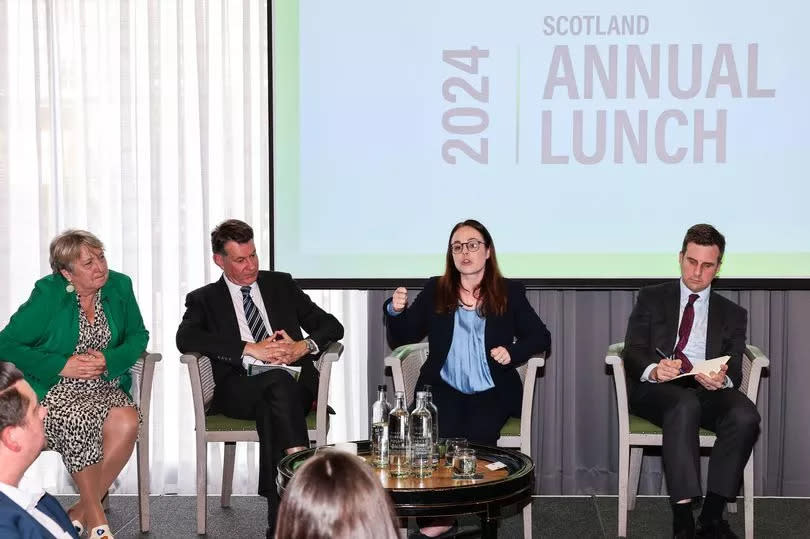Scottish politicians clash on immigration approach

Politicians from Scotland's major parties have clashed on the approach to immigration policy which could best help alleviate skills shortages.
During a hustings held at the CBI Annual Lunch on Friday afternoon, Conservative MSP for Mid Scotland and Fife, Murdo Fraser, claimed that his party in Westminster has been "very liberal about immigration since Brexit", although he admitted not enough people have been making their way to Scotland.
"We must make it more attractive for them to come", he commented, noting that job gaps were also being exacerbated by the economically inactive within society.
Deputy First Minister and Economy Secretary Kate Forbes has she found Fraser's definition of liberal in this context "amusing", while highlighting the "extremely concerning" demographic shift outside of the central belt.
"We’re unashamedly pro-immigration," she stated, "but we’re on the verge of crisis... with an ageing and declining population".
Speaking with experience of her Skye, Lochaber and Badenoch constituency, Forbes added that Highlands businesses want the rural workers visa which was promised along time ago.
Labour's economic spokesperson Daniel Johnson said a more "rational approach" to immigration was required.
While the national Labour Party was taking a "pragmatic approach" to tackling illegal immigration, he stated that Scotland must be able to make changes, with on specific measure being a second fresh talent scheme.
And Christine Jardine, the Liberal Democrat spokesperson for women and equalities, took her time to criticise the Conservatives' stripping away of overseas graduates ability to stay on and work after completing their degrees.
"These new rules are going to be prohibitive, we house them and train them for years and then don’t see any of the benefits - it's a clear block on growth," she said.

The panel, hosted by CBI chief strategy office Tracy Black, were also asked how their party in power would tackle Scotland's persistent productivity problem.
Forbes suggested there was a need to "shift the dial" on private investment to help solve the problem, while also wondering out loud what is hindering this. "Is it regulatory weight or lack of incentives, we hold our hands up and ask in government?" she added.
Jardine noted that post-pandemic shifts to flexible working appeared to have made people more productive, so there was more to do in supporting those trend, while also issuing more visas to fill skills gaps across the economy.
Fraser focused on why rent controls don’t work - arguing that they "distort the market and deter investment" - alongside a complaint that many businesses cite their biggest barrier to expansion as an inability to attract people due to the widening tax differential between Scotland and England at certain bands - pointing to complaints he heard from Ryanair bosses trying to recruit for growth at Prestwick.
Johnson, meanwhile, used the question as an opportunity to talk up his party's GB Energy company plan, suggesting it would go a long way to improve investment flows, alongside work to reform the planning system and grid processing for renewable installations, on which "we’re well behind our overseas competitors".
A question from the audience - specifically a representative from Edrington - about what the politicians would do to support Scotland's whisky industry finished the debate on a more lighthearted note.
Jardine promised to keep her personal consumption high - albeit within responsible drinking guidelines - before raising concerns about connectivity, sustainability and tariffs for the industry.
"We must support export and trade expansion," she commented, adding that for smaller producers, there must be a focus on reducing regulatory burdens and costs, citing the fact that labelling changes can add thousands to their bills.
Fraser hailed the "enormous investment" in new distilleries of late, before pointing out problems in terms of lack of housing for staff. He drew attention to the chancellor freezing duty until February 2025 and hoped that would be maintained by the next government, while also railing against potentially "detrimental" Scottish legislation like the proposed alcohol promotion ban.
Forbes was also keen to praise the "success story" of Scottish food and drink, pledging to "make sure rates work for you", alongside reducing hold-ups in planning and grid connections for new distilleries - and potentially tied housing developments that go with them.
Johnson concluded by stating the whisky industry's successes must be replicated elsewhere. This could be done with "more labour, better infrastructure" and solving the "literal bottleneck" on the un-dualled A9.
Don't miss the latest headlines with our twice-daily newsletter - sign up here for free.

 Yahoo News
Yahoo News 
